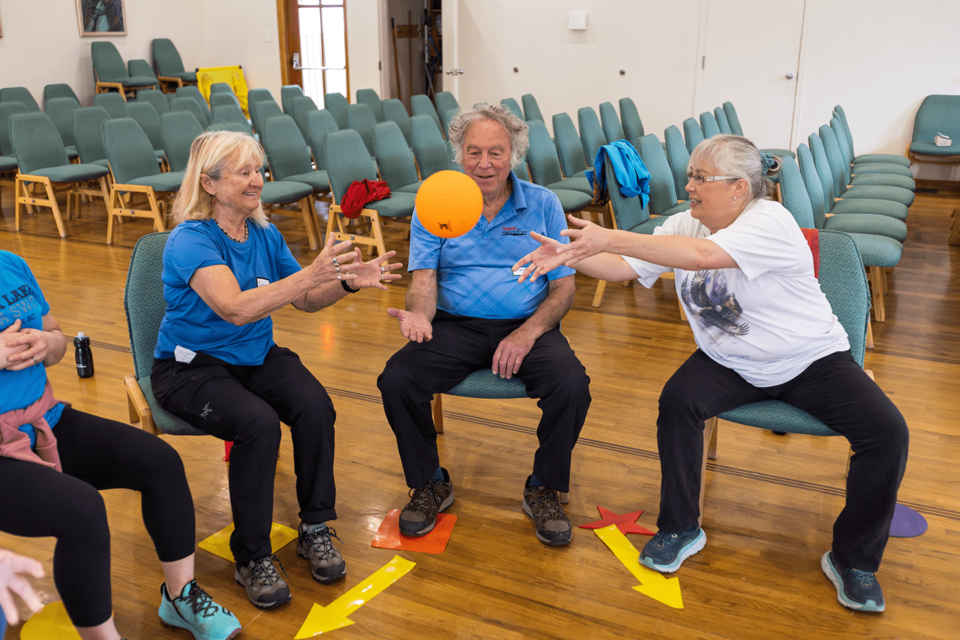Living with dementia, it wasn’t unusual for Carol Bayliss to stay in bed past noon. Wednesdays, however, proved the weekly exception, when she and her husband Glenn would head off to a local program for dementia patients and their caregivers.
“On those days, she would be up and ready to go by 9:30 a.m., asking when we were leaving,” he said. “It was something to look forward to.”
Carol wasn’t alone in her excitement: for the dozens of dementia patients and their loved ones who have taken part in the Whistler (MAC) Making Connections program over the past two years, it has offered a vital sense of community in the face of a debilitating, isolating disease.
“The one thing that happens when somebody has this type of disease is suddenly all your friends disappear. You’re no longer part of the ski group, or part of the group that goes out for dinner,” said Bayliss. “Social life basically comes to a halt.”
Billed as a “dementia-friendly social club,” Making Connections was started in October 2022 by MAC board member Charalyn Kriz, who modelled the program off offered by the Alzheimer’s Society of B.C. Each session starts with 45 minutes of gentle fitness, followed by games, music and other brain-stimulating activities, before attendees socialize over lunch.
Open to people with varying degrees of cognitive decline, provided they are not disruptive or violent, Kriz said the program is aimed at improving mental and physical health, as well as enabling dementia patients to remain in their homes longer before needing to seek advanced care.
“The participants, their physical and even mental health improves in the program,” she noted, adding some of the participants enjoy the sessions so much, they attend a similar program in Pemberton every week as well. “Balance, health, mobility, strength, all those physical things improved, but also their cognition improves through the activities we’re doing.”
The program has also proven invaluable to the caregivers who have seen their own social circles shrink in the wake of a loved one’s diagnosis.
“It’s such an isolating experience to be at home with someone who was once a bright, active partner,” said Pru Moore, who attended the sessions with her husband of 47 years, Andrew, until his death last year. “He was a brilliant surgeon and to watch him decline and cope with that was hard. It was very awkward in some social situations. To be around people who understood exactly what I was going through was a breath of fresh air.
“It came to me like a life saver.”
Bayliss said he and his fellow caregivers eventually became “like a huge family.” The program not only provided a rare chance to socialize, but also a welcome respite from their usual duties, with volunteers helping facilitate the exercise and activities. The close bonds extended beyond the weekly sessions, too.
“We looked after each other’s spouses or partners. We would help out, giving rides and doing phone calls and wellness checks,” Bayliss added. “It was a community, and they were very supportive.”
Despite the numerous benefits the program offers, Kriz said MAC struggles to attract new participants, counting about 15 regular attendees currently, partly because of the stigma that still surrounds dementia.
“When you look around the community, we all know someone with dementia,” she said. “They say they’re not ready yet, and they also don’t understand how much fun the program is.”
Held Wednesdays from 10:30 a.m to 1 p.m. at Our Lady of the Mountains Catholic Church, Kriz is concerned Making Connections may have to find a new venue come next year, when the church’s is expected for completion. She has struggled to find a suitable alternative that would be affordable and accessible to program participants.
“This is one of the challenges in Whistler, in this five-star resort: everything is so expensive, like rental space and even catering,” said Kriz. “Any other community would have spaces to use: legion halls and community centres and all that, but everything up here is so expensive.”
As for Bayliss, he said he was planning to drop his wife Carol off at hospital the day after speaking with Pique, as her condition had deteriorated to the point he could no longer care for her.
“The fact that I’m dropping her off tomorrow hasn’t really sunk in yet,” he said. “Losing those people, the friends we made in the program, I made a special point in going to the last sessions here in Whistler and the one in Pemberton and thanking everybody.”
MAC has decided to waive its normal $5 attendance fee for 2025, although registration is required. To learn more, and to register, visit .


